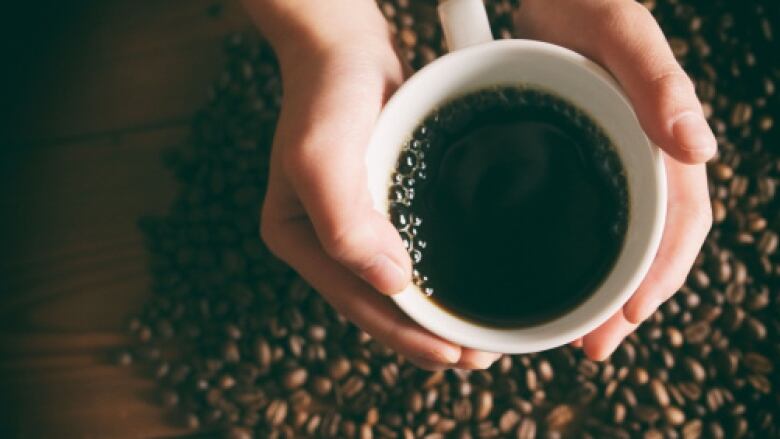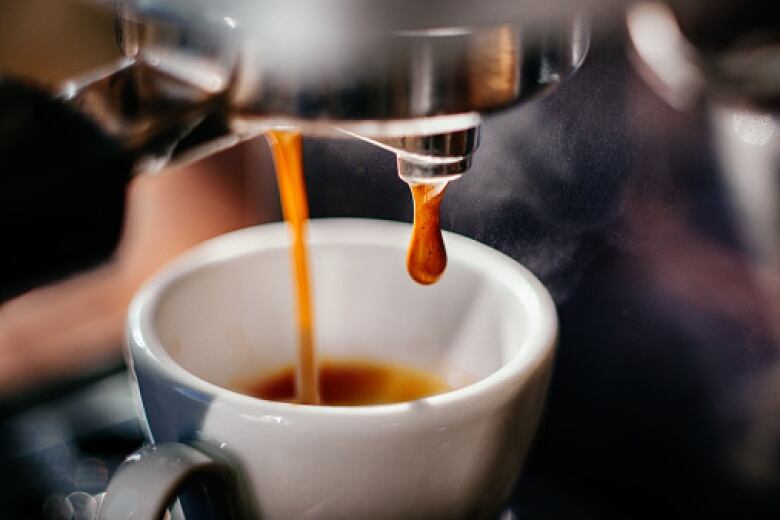Deluge of studies leaves coffee lovers dizzy
A new report says coffee poses an 'unclassifiable' health risk, adding to confusion about its safety

Keeping up with all the researchon the possible risks and benefits of coffee might require one to, well, drink lots of coffee.
The online magazineSlate, for example,calculated that as of 2010there had been more than 500 studieson the subject.
- Really hot coffee, tea and other liquids may boost cancer risk
- Coffee drinkers reassured about health risks
And as fast as you can say double-double, now comes another report, this time from the International Agency for Research on Cancer. For those keeping track, back in 1991it was the IARCthatfound that coffee is "possibly carcinogenic to the human urinary bladder."
Happily for coffeelovers, the agency has now downgraded the threat, finding thatcoffee poses an "unclassifiable" riskbecause it hasn't beenstudied sufficientlyin humans thatsubstantial body of research notwithstanding.
"We can't say that it's completely safe because proving a negative is very difficult, but it has moved down a step in terms of the hierarchy of concern,"Dana Loomis, deputy head of the IARC program that classifies carcinogens, told CBC News.

IARC's currentconcernis not with the beverage itself butwith its temperature. Itisreally hot coffee or tea that may be damaging, theywarn.
Thismay be reassuring to devotedcoffee drinkers, but itprovides littleguidance for those who are still weighing the possible health effectsyetanother headlinein a multitudethat have either sung coffee's praisesor warned of its risks.
'The flip-flopping of nutrition science'
In the 1970s and '80s, somestudies foundthat drinking coffee could increase the riskofheart problems andhigh blood pressure. But more recently, researchers have saidthatcoffee may help fight heart disease, protect against liver cancerand ease or reverse the effects ofAlzheimer's.
"I think what's interesting about the coffee story is that it's yet another example of what the public perceives as the flip-flopping of nutrition science," saysTimothy Caulfield,Canada Research Chair in Health Law andPolicy at the University of Alberta. "This food is good for you, [and then]thisfood is bad for you."
Caulfield, a self-admitted coffee devotee, points out thatthe same backandforthhappened with red wine."One worries that people will just stoplistening that they'll just think it's useless information, that you scientists just can't make up your minds."
The problem, says Caulfield, is that it can be very difficult to arrive at reliable conclusions in nutritional science, since findings are oftenbased onobservational studies ones looking at how humans behave in uncontrolled environments.This means researcherscan't necessarily provethat it was the act ofdrinkingcoffee that made someone more susceptible to cancer rather thansome other factor.
"You can't do a randomized control trialon coffee, and have a populationthat drinks coffee and a population thatdoesn't drink coffee, and follow them for 20 years," Caulfield explains.
"There are so many variables associated with this.Humans are complicatedbiologicalunits,we live incomplicated environments,wemake decisions throughout theday that impact ourhealth. Toisolate one food,one substance, isn't easy."
That was theissue witha famous New England Journal of Medicinestudy from1981, saysDr. Donald Hensrud, director of the Mayo Clinic'sHealthy Living Progam. That study, which found a link between coffee consumption and an increased risk of pancreatic cancer,wasflawedbecause it failed toadequately takeinto account smokinga behaviour often associated with coffee drinking.
Hensrud saysthatstudy, and other questionable research published at the time, helpedblight coffee'sreputation for years.

"If you look at the data, it's actually quite clear that coffee is beneficial," says Hensrud. (Full disclosure: healsolikes a good cup of joe).The evidence, according to Hensrud, shows that coffee can protect against Parkinson's, liver disease, liver cancerand Type 2 diabetes. Itmay help prevent multiple sclerosisanddementia, in addition toAlzheimer's.
Coffee improves mood, decreases the risk of depression and mayboost overall longevity rates, he adds.
However,Hensrudnotes that there are some potential downsides to coffee consumption,includingdecreasediron absorption,insomnia, heart palpitationsand, in large amounts, an increased risk of miscarriage.
"If you don't enjoy it, don't drink it," Hensrud advises. "If you enjoy it,watchwhat you put in itfor the calories.And if youdon'tsuffer from the side effects, I have a tough time telling people to cut down on coffee."
Focus on the bigger picture
Caulfieldsayspeople needto be careful of over-emphasizing both the positive and the negative effects described in many studies,and shouldn't be concerned about the small extent to which something like coffee may increase cancer.
Instead, they should focuson whether theyareeating enough fruits and vegetables, avoiding junkfoodand getting enough exercise.
"For mostpeople the important thingistofocuson that big pictureeating a healthy diet andnot worryaboutthesemarginal risks," he said.
And as for coffee, he has one message: "If you lookat the body of evidence out there about coffee, it's probablynot bad for you, and may be good for you. So drink up."












_(720p).jpg)


 OFFICIAL HD MUSIC VIDEO.jpg)
.jpg)



























































































